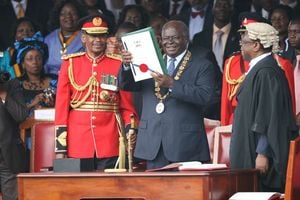
The High Court in Kiambu has stopped Jeremiah Nyegenye, the Secretary to the Parliamentary Service Commission who is also the Clerk of the Senate, from forwarding the names of the IEBC selection committee to President Ruto for appointment.
The process of reconstituting Kenya's electoral body could be far from over after the High Court, in the latest twist, stopped the names of the selection committee from being sent to President William Ruto for appointment.
The appointment of commissioners for the Independent Electoral and Boundaries Commission (IEBC) has been a complex and contentious process, marked by intense political divisions and numerous legal challenges.
The High Court in Kiambu has now stopped Mr Jeremiah Nyegenye, the Secretary to the Parliamentary Service Commission who is also the Clerk of the Senate, from forwarding the names of the IEBC selection committee to President Ruto for appointment.
Kiambu Magistrate Dorah Chepkwony also restrained the clerk from publishing or gazetting the names pending the determination of the case.
Mr Boniface Njogu questioned whether the appointments were in line with Articles 10 and 54(2) of the Constitution, which require the state to ensure the progressive implementation of the principle that at least five percent of members of the public in elective and appointive bodies are persons with disabilities.
Mr Njogu argued that he feared that if the President appointed the nominees, his case would be rendered meaningless.
He argued that the commission only lasts 90 days and if the order is not granted, the application will be overtaken by events.
Monday's ruling threw a further spanner in the works of reconstituting the electoral body amid upcoming elections across the country.
It came as the Azimio la Umoja-One Kenya Coalition remains embroiled in a dispute over the rightful representation of small parties on the IEBC's selection panel.
While Wiper leader Kalonzo Musyoka has backed Ambassador Koki Muli to represent the minority coalition, the National Labour Party (NLP) says its candidate, Dr Augustus Kyalo, was duly elected on July 26, 2024.
On Tuesday last week, the High Court overturned the Political Parties Disputes Tribunal's ruling that Dr Kyalo was the legitimate representative of small parties on the IEBC's selection panel.
Ambassador Koki Muli and the Azimio la Umoja-One Kenya Coalition, had gone to court to challenge the PDP's decision to nominate Dr Kyalo.
The Nation has established that political interests on both the opposition and government sides have intensified the disputes as each coalition seeks to shape the future of the electoral body to suit its strategic interests ahead of the 2027 elections.
The wrangling over the process has seen court battles and opposition from stakeholders who argue that the process must remain transparent and independent.
Meanwhile, international allies, including the United States, have urged the Kenyan government to uphold democratic practices by ensuring an impartial and credible IEBC.
Last week, US Ambassador to Kenya Meg Whitman spoke out on the issue, stressing the importance of strengthening democracy.
"The IEBC's ability to support democracy in Kenya is at risk without the recruitment of commissioners or parliamentary action to provide the IEBC with funding for voter registration, by-elections and other activities," she said.
Despite these pressures, the way forward remains fraught, with no clear resolution on how to balance political influence with the independence of the electoral process.
Under the Political Parties Liaison Committee (PPLC), the majority coalition, minority coalition and non-parliamentary parties were to select one candidate each.
Mr Evans Misati was elected to represent the non-parliamentary parties, while Mr Nicodemus Bore was elected to represent the majority party.
For the minority coalition, Dr Kyalo's National Liberal Party (NLP) was elected, defeating Wiper's Ambassador Koki Muli in an election presided over by the IEBC.
However, the opposition coalition attempted to replace Dr Kyalo with Ms Muli, triggering the current court battles.
Dr Nelson Makanda and Fatuma Saman, who were on the previous selection panel, were retained by the Inter-Religious Council, while Tanui Andrew Kipkoech was selected by the Institute of Certified Public Accountants of Kenya.
The Law Society of Kenya (LSK) has one slot and the Parliamentary Service Commission (PSC) has two.
On Monday, the Registrar of Political Parties, Ms Anne Nderitu, wrote to Azimio Secretary-General Junet Mohamed to consider the inclusion of the National Liberal Party (NLP) in the nomination of the minority coalition's representative on the selection panel.
This followed a letter of protest from NLP Secretary-General Omondi K'Oyoo over what he described as a plan to marginalise the party even after its victory in the July 26 election.









